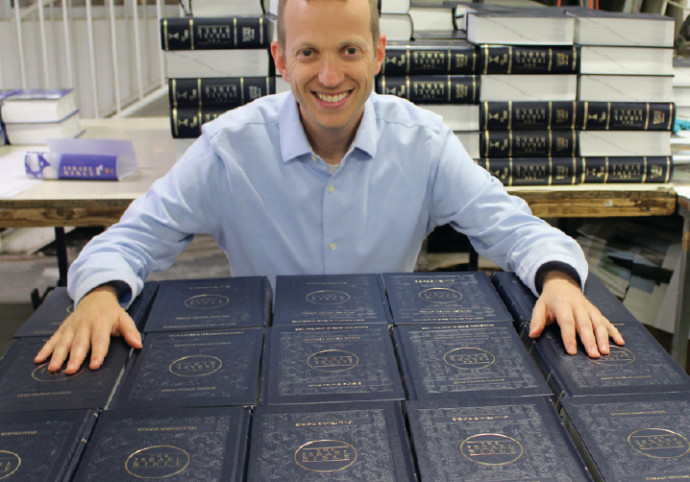One would have hoped that yesterday’s unique convergence of Passover, Easter and Ramadan would have led to a wonderful day of peace and brotherhood in the spiritual capital city of Jerusalem. Alas, any dream of religious harmony on a day holy to all three great Abrahamic faiths, was shattered by Muslim rioters who turned the Temple Mount into a bloody battlefield hurling stones at Jewish worshippers and Israeli vehicles.
Palestinian terrorists have been fanning the flames of religious violence in recent weeks, as Israelis have been preparing for the Passover holiday, observed this week. On Thursday evening, April 8, a Palestinian terrorist attacked Tel Aviv’s busy Dizengoff Square where mainly secular Israeli young people were crowded at bars and cafes, tragically murdering three Jews in their 20s.
Shortly after the deadly massacre, Hamas explained their motive and declared, “The continuing terrorism of the occupation and its crimes, attempts to Judaize Jerusalem and to perform sacrifices in the Al-Aqsa Mosque to build its so-called ‘Temple’ during what they call ‘Passover’ — against it stands blood and bullets.”
Through their statement, Hamas exposed their greatest fear: that Israel will start to build the Temple.
For thousands of years, Jews have been praying for a return to the Land of Israel. Over the last century, we have miraculously been restored to our homeland from the four corners of the earth, but are still awaiting the proper time to build the Temple.
Judaism is incomplete without the Temple, and Passover is a prime example, as Deuteronomy makes clear:
“You are not permitted to slaughter the Passover sacrifice in any of the settlements that Hashem your God is giving you; but at the place where Hashem your God will choose to establish His name, there alone shall you slaughter the Pesach sacrifice, in the evening, at sundown, the time of day when you departed from Egypt.”
(Deuteronomy 16:5,6)

Hamas is terrified that after close to 75 years of statehood, Israel will begin turning its attention to the place where God chose to establish His name. In fact, each year, more and more Israelis take the dangerous risk of ascending the holy mountain under the hostile guards of Jordanian officials.
Palestinian terrorists are getting scared as Jews are getting serious about restoring our holy of holies, the site we pray towards every day, and the building we beseech God for repeatedly throughout our liturgy.
On a national level, the rebuilding of the Temple would be a great humiliation to Palestinian terror groups, but on a religious level, the construction of Judaism’s Third Temple would in no way pose a threat to Islam, whose main religious holy sites are in Mecca and Medina.
Responsible Jewish, Christian and Muslim leaders should use this recent wave of Islamic violence to immediately begin discussing practical and peaceful steps for the rebuilding of the Temple on the Temple Mount. It could be done without damaging or disrespecting the Dome of the Rock or Al Aqsa, as part of a future peace plan between Israel and her Arab neighbors to end the plague of Islamic terror once and for all.
During periods of history, Islam held great respect for Judaism’s Temple in Jerusalem, and one can imagine many potential scenarios in the ever-changing Mideast, where significant segments of Islam could do so once again.
Similarly, for many centuries, Christianity looked at the Temple with hostility, but as relations between Jews and Evangelicals have improved in recent years, some Christians are rethinking their relationship with the Temple.
I asked John Enarson, the Christian relations director of Cry for Zion, a Temple Mount advocacy group, what his thoughts were on the connection between Easter and the Temple, and the implications for Christians today.
“We Christians have often thought that Resurrection Sunday spelled the end for the Holy Temple in God’s plan,” Enarson explained. “But when we read the Gospels and Book of Acts carefully, the Apostles continued to be passionate for God’s House in Jerusalem, including Paul. As God is restoring Zion, we need to rediscover our own texts with Jewish glasses, and that includes God’s Temple.”
WIth more Christians coming alongside the Jews and becoming passionate about the need to rebuild the Temple in Jerusalem, we have a unique opportunity today.
Rather than lamenting the terrible violence that disrupted Passover, Easter and Ramadan, we must take steps to prevent religious violence from causing further blood to be spilled in the streets of Jerusalem. It’s time for peace-loving Jews, Christians and Muslims to come together and build the “house of prayer for all nations.”
Rabbi Tuly Weisz is the founder of Israel365 and the editor of “The Israel Bible” and invites reader feedback at rabbituly@israel365.com.
